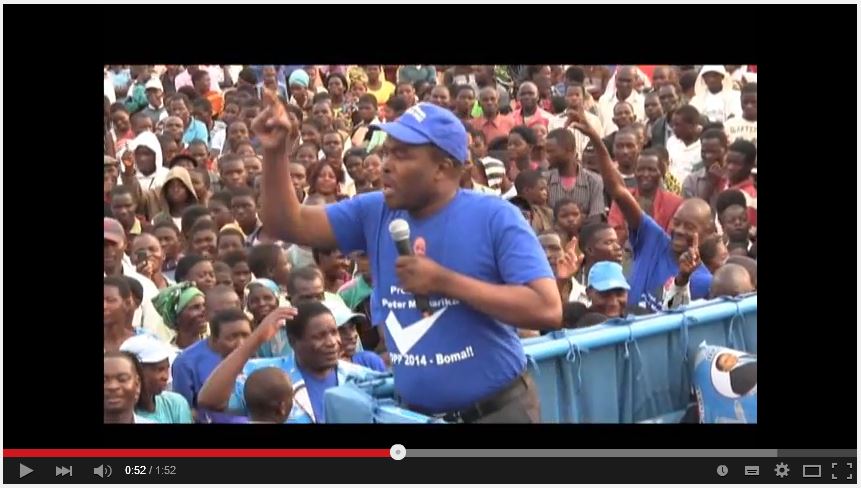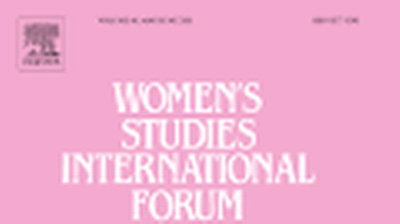A Different Yardstick: The Gendered Political Discourse in Malawi
How to cite this publication:
Edrinnie Lora-Kayambazinthu, Edith Kalilombe Shame (2016). A Different Yardstick: The Gendered Political Discourse in Malawi. Bergen: Chr. Michelsen Institute (CMI Brief 5)
The 2014 election campaign in Malawi focussed on gender rather than facts. In this brief we argue that the campaign showed a strong, conservative, culturally driven bias against Banda and other women leaders. the discourse on Banda’s performance and subsequent loss in the election was not so much in terms of a leader who failed, but as a woman who failed.
Through an analysis of the widely distributed video clip entitled Sesa Joyce Sesa (Sweep out Joyce sweep her out), and other videos, pictures, and blogs, we demonstrate that the yardstick in politics in Malawi is different for women.
Malawi held tri-partite (local, national assembly, and presidential) elections in April 2014. The incumbent female president Joyce Banda lost the presidency and the number of women in the parliament was reduced from 43 to 33.
During the 2014 election campaign there were numerous, very negative portrayals of President Joyce Banda as a woman. The campaign discourse was couched within her gender. Banda’s womanhood was used against her to undermine her legitimacy as president, and to judge her performance. Typically and repeatedly it was said “a woman cannot lead a country”, “a cow cannot pull a cart”, and “the head of the house is a man”.
Joyce Banda’s Presidency
Vice-President Joyce Banda came to power by default when President Bingu wa Mutharika died in office in April 2012. Initially, Malawians welcomed her ascendancy to power, and many held the expectation that she would turn the economy around.
Banda’s response to citizen expectations, donor expectations, and her own ambitions were to make simultaneous approaches. She quickly restored donor confidence, she devaluated the local currency and reduced the import bottlenecks, and she improved the relations with neighbouring countries. She went on to reverse a number of her predecessors’ less popular decisions, and she improved the human rights situation and strengthened the rule of law.
President Banda found herself in an un-anticipated situation, however, having to take over office so soon, and her status as an ‘accidental’ president was to haunt her entire presidency. She was met with stiff resistance from the ruling party (Democratic Progressive Party, DPP) and its cadres, who dominated the parliament and were un-willing to hand over the presidency to someone they had earlier expelled from the party, and who had formed a party of her own (the People’s Party, PP). She only had two years to prove that she had the competence and the will to lead the nation, and to win enough support to have a full five-year term in office from the 2014 elections.
Soon, negative proverbial sayings started to surface. Joyce Banda was met with criticism for her wastefulness, her sporadic and erratic initiatives of distributing goats, cows, maize and other commodities, for building houses for selected people, and for her appetite for travel.
Although her behaviour was akin to previous presidents in terms of survival tactics and amassing wealth for political survival and campaigning, which could well be considered ‘normal’ and based on previous patterns, she became criticised as a woman. Although former male presidents had also been clumsy, mediocre, and made outright mistakes, the mistakes made by Banda as a female politician, in contrast, were magnified into incompetence. Female mediocrity was to be scorned, ridiculed, and punished. The yardstick was different. She became the woman, and not the leader, running out of steam.
Language and Metaphors
Language is not always a transparent medium of communication. It can conceal ideologies. Political campaigns very often lack civility in the way candidates communicate with and about each other: we often see positive self-representation and negative representation of others. Our argument is that in Malawi, the negative representation of others was expressed as an ideology in which women were less valued and not acceptable for political leadership. The overt and covert stereotyping of President Banda’s leadership followed her traits as a woman.
The political discourse of the politicians and political parties in the various media used during the election campaigns in Malawi in 2014 illustrates the point. For analytical purposes, we have included a video, plus images and political comments, for analysis. We have transcribed the video, called Sesa Joyce Sesa (Sweep out Joyce sweep her out) (see text box), and supplemented it with fragments from news, radio interviews, proverbs, media postings and party jingles, both from supporters and opponents of the campaigning president.
“Sweep her out!”
The video recording Sesa Joyce Sesa featured Mr George Saonda, a DPP spokesperson at the time of the production. Prior to the production of the video, Joyce Banda had held a rally at Goliati in Thyolo district, the home village of the late president’s brother, Peter Mutharika (who was now the presidential candidate of the DPP, and became president after the elections). At Banda’s rally, the Minister of Health, Catherine Gotani Hara, had made some ‘provocative’ remarks, claiming that the DPP candidate Mutharika was not automatically qualified as president simply because he was the brother of the late president. She said, “If your brother was a doctor does it mean you will also be a doctor?” The DPP supporters interpreted this as a provocation, made in their own constituency, and a fracas ensued which even claimed the life of a policeman.
In order to repair the damage, Peter Mutharika later held a rally at the same village, and the video was shot at that occasion. Mr Saonda was filmed at the back of a truck, making a powerful oratorical proclamation. The video was soon circulated via WhatsApp, YouTube and other social media, and it was popularised as a de-campaigning tool used against President Joyce Banda and her PP.
The video portrays Banda in the light of archaic, patriarchal beliefs and values. Mr Saonda uses religious and cultural metaphors to communicate his message of how useless women are, how empty of knowledge Joyce Banda is, and that she should be swept out. The video is a personal attack of her womanhood.

Using religious and cultural metaphors, the video selects conservative and male-chauvinistic practices that every Malawian can identify with. The video recording became popular because of the powerful rhetorical effects, the rich metaphors, and its rhythm.
First, the act of being removed from power is represented in the video through the action of removing rubbish (to sweep, sesa). This has a grooming effect as a daily, repeated activity, and sweeping is converted into an act of removing from power. Besides, the dialogue structure stands out: the campaigner broke his arguments into single utterances followed by a chorus. An easily memorable poetic rhythmic was created, into which arguments were slotted.
Speaker: “Sweep out Joyce sweep out” (“Sesa Joyce sesa”)
Audience: “Sweep out!” (“Sesaaaaa!”)
This structure had the effect of allowing repetition of the metaphor sesa, and the audience is not only listening but also participating in the symbolic action of sesa through gestures and chanting. Hence, the meaning is reinforced through audience inclusion as well as the sheer repetition of sesa.
Secondly, religious dogmas and cultural analogies are evoked in a way that not only positions Joyce Banda as rubbish, but as one who disregards culture and the natural, religious, and common sense in the gender division of labour.
“I want to find out from you one thing (pardon me), time is against us, the Catholic church, a Christian church, if the priest is away, can a Sister administer the Eucharist?”
Here, the campaigner underscores what is unnatural, un-cultural, and un-Christian: Banda’s power is illegitimate. The Catholic priest, who under any circumstance is male, reinforces the natural hierarchy of power along gender lines. The Sister, who under any circumstance is female, should only act under the leadership of the priest. A similar reference to Islam then further universalizes the religious convention:
“I wanted to ask you (I beg your pardon!), even for the Muslims, at the Mosque, if the Sheikh is away, can women serve in front of men?”
Thirdly, the video alludes to traditional beliefs and customs as it refers to how, traditionally when a man dies, another man is requested to have sex with the widow with the purpose of ‘cleansing’ her and free her form her dead husband’s spirit. The man who ‘cleans’ the widow is called a hyena (fisi), but the hyena does not inherit the wife after cleansing her and he cannot claim that the widow is his wife. The campaigner in the video makes an analogy to this custom, asserting that Banda is not supposed to continue ruling as her position was expected to be only temporary.
“I beg your pardon, there are things you inherit because somebody has died/passed away; when a hyena sleeps with the wife of a deceased husband the hyena cannot claim that she is his wife.”
The Use of Labels, Symbols, and Descriptions
Naming names can also confirm or limit power. The referring expressions in campaign discourses not only identifies individuals, but has a political function in drawing attention to certain aspects of their identity. Let us look at a few selected ways of referring used for the four presidents Hastings Banda, Bakili Muluzi, Bingu wa Mutharika, and Joyce Banda.
First, we have official functionalisation, phrases that describe the individual in his/her professional capacity, thereby legitimating the individual in that role. For instance, Bakili Muluzi, the first President of multiparty Malawi. And, due to the fact that presidency is a male-dominated area, the occupation of this position by a woman can be explicitly marked, as in Joyce Banda, the second female Head of State in Africa.
This sort of labelling was common in the news announcing Banda’s ascendancy to the presidency, and continued throughout her reign in local and international news. This strategy was used also in the PP campaigns, with what was considered a laudatory epithet: Joyce Hilda Banda, the first female President of the Nation of Malawi. She was praised as being unique and trendsetting.
Secondly, the use of the relational epithet, which described Joyce Banda in terms of her domestic role, ‘mother’ (‘amayi’), was more popular than any other label. However, what may seem natural and common sense in referring to her as ‘mother’ reveals the ideologies held by the speakers when assessed against alternative expressions. The term ‘mother’ fixated her image on her domestic role, for which it is ‘natural’ to place a woman. The label ‘mother’ embodies a nurturing role, but it is devoid of political power, and a number of images circulating on social media were ridiculing Joyce Banda’s mothering role.
In contrast, the use of the domestic title ‘father’ (‘tate’) for Hastings Banda extended the sphere of reference to his power and to the whole nation: The Father of the Nation. Labels that elevated Joyce Banda as a person of great strength and power were either unpopular or non-existent in the discourse.
Thirdly, we should understand the preponderance of a domestic label against the background of objectivisation. Objectivisation is to refer to individuals using animal symbols, objects, and icons, and the qualities of the object are then transferred to the individual who bears the label. Objectivisation can be a strategy for both positive and negative representation.
Hastings Banda was popularly known as The Lion of Malawi (Mkango wa Malawi), an epithet symbolizing ferociousness and power. Both Hastings Banda and Bingu wa Mutharika were furthermore bestowed with the qualities of bravery and prowess through the title Powerful Warrior (Ngwazi). Bingu wa Mutharika was also known as Rail Steel (Chitsulo cha njanji), symbolizing great strength and resilience. Campaign material described Peter Mutharika as the biggest and prized catfish in Malawi, ‘bombe’ (as for instance in the Sesa Joyce sesa video clip).
Campaigners for Joyce Banda simply described her as The great one (Kumtunda), and as The first female president. This term lacks the substance of greatness of terms like the lion and the giant catfish (and even iron, as in epithets used for Margaret Thatcher, Golda Meir, and Ellen Johnson Sirleaf).

The Use of Images
Campaigners and political activists also used a number of manipulated pictures and cartoons to depict Joyce Banda in negative terms. She was portrayed as a snake in the grass in many images published on-line. Another very tainting image was in connection with the cashgate corruption scandal, where she was portrayed as a reggae artist playing the same song over again.
Joyce Banda’s choice of a young male running-mate also became a gender issue, and was ridiculed on social media. Like her predecessors, Joyce Banda dropped the incumbent vice-president for the benefit of a younger man, Sosten Gwengwe. One Instagram picture showed a motherly figure (Banda) nurturing a baby (Gwengwe,), too far her junior, almost her son. This was quite unfair, as almost all political parties (with the exception of the Malawi Congress Party, MCP) had younger aspirants either as running mates (like DPP’s Saulosi Chilima) or as presidential candidates (like UDF’s Atupele Muluzi), and all the parties made a bid for the youth vote.
Her Defence Strategy
Although the campaigns against Banda focussed on ridicule, corruption and fraud, the PP did not counter-attack. Instead, they played into the gendered discourse and concentrated most of their defence on restoring her womanhood—in positive terms. They appealed to womanhood without emphasising leadership qualities. “Being a woman should not be a hindrance” (“Kukhala mzimayi sichifukwa”) and “give space, our mother should pass” (“odi uko amayi adutseko”) were the slogans that formed the hub of Joyce Banda and the PP election campaign.
Campaigners urged voters to vote according to gender lines, regardless of political ideologies. This demonstrates how strong the gender aspect became in the election campaigns.
“This is your first chance in life / this is your first chance to have a female president so who will be the unwise woman here / even for an elections monitor of a different party / if you are a female monitor vote for this woman.”
Gender Stereotypes or Policy Issues?
The above demonstrates how far the last elections in Malawi were engendered with the coming to power of the first woman president. We have shown that although Joyce Banda failed to be re-elected as a Malawian leader, her failure was measured along gender lines, and that the 2014 elections were run on gender opinions rather than facts, and on women stereotyping rather than policy issues, on both sides of the political spectre.
We believe that the political parties, candidates and the media, in election campaigns, should stop restoring to socio-cultural aspects of gender and to restrict the use of gendered imagery and metaphors to undermine political rivals. Political party communication strategies communicating issue-based messages and policy options would be an advantage, not only to the women seeking political office in Malawi, but also to the broader democratisation process.
Sesa Joyce sesa!
Transcript of the videoclip with George Saonda.
“A human being, here at Goliati, dressed in a PP cloth, who killed the person? Who murdered the deceased? That is the one, that’s him! Sweep away Joyce, sweep! Sweep her away! I want to find out from you one thing, time is against us, the Catholic church, a Christian church, if the priest is away, can a Sister administer the Eucharist? No! Finger up! (Points/gestures at the candidate, Peter Mutharika). People of Goliati village, if you lose this big fish seated here, we are unfortunate people, take Joyce and place her here, then take the great one and place him here, you already know the answer, you already know what is right. You already know who is the suitable candidate. I wanted to ask you, or I beg your pardon! Even for the Muslims at the Mosque, if the Sheikh is away, can women serve in front of men? No! Sweep away Joyce, sweep! Sweep her away! I beg your pardon; there are things you inherit because somebody has died, when a hyena sleeps with the wife of a deceased husband, the hyena cannot claim that that is his wife. No! Sweep away Joyce, sweep! Sweep her away!”
In Chichewa:
“Munthu, kuno kwa Goliati, atavala nsalu ya PP, anapha munthu ndi uti? Ndiyemweyo! Sesa Joyce sesa! Sesa! Ndimati ndikufunseni chinthu chimodzi, nthawi silola, Catholic mpingo wa chikhristu, kodi wansembe akachoka, a sister amadyetsa mgonero? Ayi! Sesa Joyce sesa! Sesa! Chala m’mwamba! Inu anthu a kwa Goliati, mukaluza bombe wakhala apayi ndife anthu atsoka, (eya) kumutenga Joyce kumubitsa apa, nde mutenge mtunda musiye apa, nokha mukuziwa, choona ndi chiti, (eya). Sesa! Ndimati ndikupempheni, ngakhale kwa asilamu, eh kunzikiti shehe akachoka, eh azimayi amapita eh kukatumikira kutsogolo? Ayi! Sesa Joyce sesa! Sesa! Chala m’mwamba! Ndati ndikupempheni, zilipo zina umatenga chifukwa poti pafa munthu, fisi akapita kukalowa mnyumba eni nyumba akamwalira, fisiyo samati mkaziyo ndiwache.”
The video can still be found on Youtube: https://www.youtube.com/watch?v=_LY4nDFXqW0
CMI and the Department for Political and Administrative Studies (PAS), University of Malawi, has a joint research project on Democratisation, Political Participation, and Gender in Malawi financed by the Norwegian Research Council. This CMI Brief is an abbreviation of a chapter in the book Women in Politics in Malawi, Inge Amundsen and Happy M. Kayuni (eds) (forthcoming September 2016).




![Corona überleben: Die Figur der:s Überlebende:n als Trägerin von Hoffnung und Angst in den Politiken einer Krise im Werden [Surviving Corona: The figure of the survivor as bearer of hope and fear in the politics of an emerging crisis]](http://www.cmi.no/img/400/18259-Corona-und-mediale-ffentlichkeiten.png)
